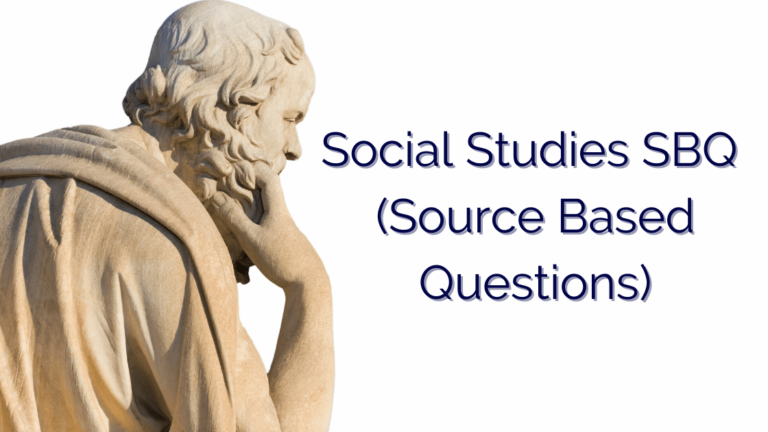Case Study: France’s Assimilation Policy
In the Social Studies textbook on the issue of diversity, we study how the Case Study of how France has an assimilation policy to try to assimilate Muslim immigrants from Africa into French culture. This is part of the chapter on how countries manage socio-cultural diversity.
However, the assimilation policy has run into a problem as the French are strong believers of secularism, something which not every immigrant might believe. What is secularism? It is the belief that government and religion should remain separate.
You can see this in secular nations like Singapore and United States, where the government does not participate in or interfere with the religions private citizens believe in.
However, the French belief in secularism is slightly different. Their version, grounded in the concept of laïcité, private citizens are encouraged not show any religious affiliation in the public to separate religion from government.
Tensions in France
This has become a source of tension between the Muslim immigrants from Africa and French society. This is especially since 2004 when the French government banned the burqa, a way of dressing that many Muslim women believe is necessary for their faith.
Furthermore, some cities along the French Riviera tried to ban the burkini, a type of Islamic swimwear that looks like a wetsuit paired with a waterproof headscarf, in 2015. While this was overturned by the French high courts, this is another sign of discrimination against Muslims.
Another continuous flashpoint is the controversial cartoons caricaturing Muhammad that Charlie Hebdo, the French satirical magazine, published and continued to republish over the years. This has caused attacks on the headquarters of the French magazine by radical Muslim terrorists as these cartoons are considered blasphemous.
As these examples have suggested, the French assimilation policy has not worked. Immigrants from Muslim countries in Africa have struggled to fit in. Despite this, France has preserved in their endeavour.
In fact, I will argue that not only did the assimilation policy not work, this policy actively discriminated against Muslims, causing even further rifts between Muslims and French secular society.
Reasons for the Continuation of the Assimilation Policy
Why has France continued with assimilation policy then? In fact, the French had tried integration in the 80s and 90s, but only restarted assimilation in the 2000s. I suggest that the following are reasons why the French have continued with the assimilation policy:
a. “Assimilation” Colonisation
One of the major reasons is the tradition behind assimilation. Between the 17th and 19th centuries, France played the role of the centre of high culture worldwide. Hence, to the French, they believed that their culture was the highest.
This translated into their ‘civilising mission’ in the colonies they owned. During the colonial era, the French colonial government taught its colonies that they needed to adopt the French language and culture so that they can become French. Thus, the idea of assimilating started even before these people migrated to France.
Given the strong belief that French culture is the best and the long tradition of assimilation, it is no surprise that they have continued to insist on the assimilation policy.
b. Increase in Extremist Terror Attacks
Another reason for the continuation of the French assimilation policy is the belief that the integration policy has failed due to the increase of attacks inspired by extremist Islamic ideology in the 1990s.
In the mid-1990s, France was targeted twice by the Armed Islamic Group of Algeria, once via a hijacking of an Air France plane and another time by the bombing of public transport systems in Paris and Lyon.
In the 2000s, the number of terror attacks by Muslim extremists increased significantly. The most prominent attack was the September 11 attacks on America in 2001. Other attacks include the Bali bombing in 2002 and the Madrid train bombings in 2004.
Even though the later attacks did not happen in France, I believe that these attacks convinced the French elite that the Muslim immigrants in their own country might be a danger to secular French culture. This made them double their effort to assimilate Muslims.
c. Rise in Nationalist Sentiments
At the same time, nationalist or right-wing ideology started to become popular in France. In 2002, the centre-right party, the Union for a Popular Movement (UMP) came into power. The more extreme far-right Jean-Marie Le Pen’s relative success at the 2002 Presidential election was also another sign.
These politicians came into power partly because of the influx of Muslim immigrants into France and the perception that they could not blend into French society. Certainly, the rise of radical Islam and the terror attacks attributed to it played a part.
During this time, the Muslim community faced in French faced discrimination. The 2004 Burqa ban mentioned in the Social Studies textbook is an example of such discriminatory policies.
In 2005, tensions exploded when youths of African, North African, and Arab heritage took part in riots and burned cars and public buildings. The government blamed the riots on foreigners and tightened immigration laws.
Thus, forces in French politics ultimately ensured the re-introduction of the assimilation policy. Muslims continue to be forced to assimilate as nationalists still drive policies.
Conclusion
As you can see from my brief narrative, assimilation is likely to continue in France, despite it being very clear that assimilation has not united France. Instead, it seems to have sparked a cultural war between the Muslims and secular society in France.
I hope this article gives some ideas on the assimilation policies in France and if an SBQ question comes up, students will have enough context to understand the complexities of this topic.
Sources
https://theconversation.com/the-long-troubled-history-of-assimilation-in-france-51530
https://time.com/4119946/frances-assimilation-challenge/
https://en.wikipedia.org/wiki/Political_history_of_France

Critical Thought English & Humanities is your best resource for English, English Literature, Social Studies, Geography and History.
My experience, proven methodology and unique blend of technology will help your child ace their exams.
If you have any questions, please contact us!







